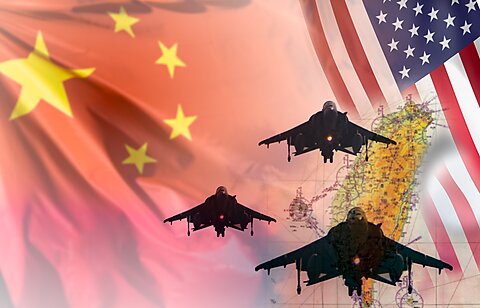Jordan Cohen and Eric Gomez
Taiwan is waiting to receive $19 billion worth of US weapons that have been sold but not yet delivered, a sum almost equal to Taiwan’s entire proposed 2024 defense budget. The Biden administration’s willingness to funnel US weapons to Ukraine and Israel for “as long as it takes” ought to be causing some heartburn in Taipei, but that does not appear to be the case.
At a recent international forum in Halifax, Taiwan’s deputy foreign minister Roy Chun Lee told reporters, “The commitments from our US colleagues to the war in Ukraine, also the conflict in Israel, is not undermining its ability to deliver on its weaponry commitments.” Hsiao Bi‐khim, Taiwan’s current de facto ambassador to the United States and recently announced vice presidential candidate for Taiwan’s ruling Democratic Progressive Party, has similarly argued that US weapons aid to Ukraine is “not a subtract from Taiwan and giving them to someone else situation.”
Taiwan’s officials ought to be more concerned than they are letting on. While the current overlap between the US arms backlog for Taiwan and weapons being sent to Ukraine and Israel is not as severe as some commentators argue, the overlap is growing over time. In other words, Taiwan’s officials are not whistling past the graveyard yet, but they are getting closer to the graveyard the longer current trends hold.
There are two ways in which the arms backlog for Taiwan is distinct from US support for Ukraine and Israel: the legal mechanism for providing weapons and the weapons themselves. The United States has used Presidential Drawdown Authority or PDA to pull weapons out of US stockpiles and immediately send to Ukraine. US arms sales to Taiwan, on the other hand, are traditionally Foreign Military Sales or FMS, which involves building and selling new weapons through a lengthy bureaucratic process.
Delivering weapons via PDA is faster than the FMS process because the weapons transferred using PDA are already built and there is less review in Congress and the relevant executive departments. The types of weapons in Taiwan’s backlog—such as anti‐ship missiles and long‐range missiles—also have more overlap with other countries—especially Saudi Arabia—than Ukraine.
These two areas of difference, however, are slowly but steadily changing as the Ukraine conflict has stalemated and Washington promises more support for Israel.
The 2023 National Defense Authorization Act extended PDA to Taiwan to the tune of $1 billion per year. In July 2023, the Biden administration transferred $345 million of equipment to Taiwan using PDA, but it did not say what weapons it transferred. Washington could use PDA to clear parts of the Taiwan arms backlog quickly, but this could create more direct competition for resources between Taiwan and Ukraine if weapons are transferred under the same mechanism instead of using different mechanisms. US weapons stockpiles that PDA draws from were already under strain before Taiwan’s first PDA transfer and Hamas’s attack on Israel.
More countries drawing on US military stockpiles will have a knock‐on effect on weapons supply chains. Reductions in stockpiles will need to be backfilled with new equipment, which could increase production times and delays for FMS sales. Taiwan, for example, had to increase its purchase of HIMARS rocket artillery to offset a delay in Paladin mobile howitzers, a capability that the US donated to Ukraine.
The overlap in the types of weapons in the Taiwan backlog and the weapons it is sending to Ukraine is also growing over time. As the conflict in Ukraine has dragged on, the United States has sent Ukraine more weapons that are also part of the arms backlog to Taiwan, such as HIMARS, Abrams tanks, F‑16 aircraft, and ATACMS missiles. The United States and NATO also want to make Ukraine’s military look more like NATO militaries, which will further exacerbate this problem.
Relatedly, any escalation in Israel’s war in Gaza that draws in Hezbollah or even Iran would create overlap with Taiwan when it comes to long‐range strikes and advanced air defense systems. Consequently, as wars around the world intensify, the risks of US production lines being unable to quickly produce weapons for Taiwan increases.
Taiwan’s $19‐billion arms backlog is significant. Currently, it is not entirely caused by existing conflicts in Ukraine and Israel, but instead because of how Taiwan ordered weapons included in the backlog. Nonetheless, over time, conflicts in Ukraine and Israel could very likely make this problem worse. As a result, political leaders in Taipei and Washington need to seriously consider how to prioritize Taiwan’s ability to deter and defend itself against China.


























